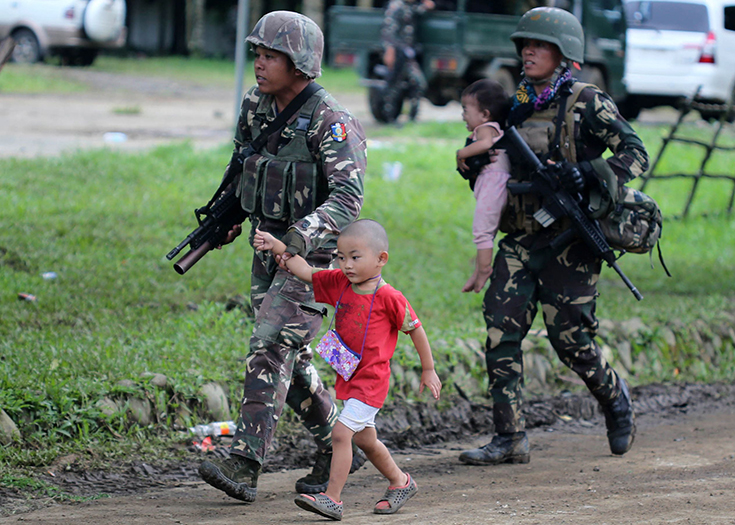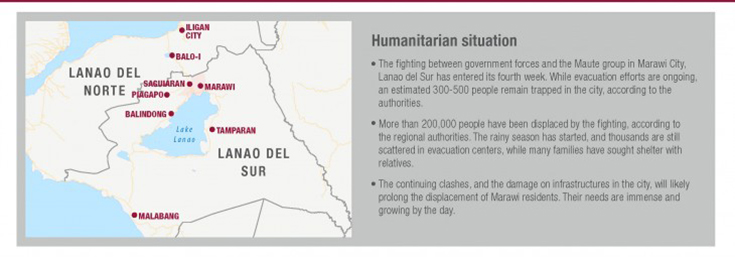Marawi fighting continues amid fears for displaced population
Lina Kolesnikova reflects on the ongoing situation in the Philippine city of Marawi, where thousands of residents have fled after fighting between the country's armed forces and rebels

Filipino soldiers hold on to fleeing children following reports of fresh clashes between government troops and rebels in Marawi City, Mindanao Island, southern Philippines, 25 May 2017 (photo: Linus G Escandor II/Rex)
Terrorism is not about geography or territory – it is about an ideology. And the proof of this is witnessed in the sad events that occur practically each day around the globe. Despite the success of the counter-ISIS operation in the Middle East by coalition and regional forces, terrorist attacks inspired by the ISIS ideology are still carried out in different countries. They are performed by organised groups, small cells and lone wolves.
Events in the Philippines are particularly dramatic because they may change the whole security picture in South-East Asia, which is struggling for peace among its multi-faith population. Indeed, it could be said that ISIS has launched a new South-East Asian front in its campaign of global jihad.
The influence of ISIS has spread throughout South-East Asia in recent years, with more than 60 groups in the region pledging allegiance to the self-declared caliph Abu Bakr al-Baghdadi, according to Rohan Gunaratna, head of the Singapore-based International Centre for Political Violence and Terrorism Research (ICPVTR).
Philipino President Rodrigo Duterte placed the southern island of Mindanao under martial law after armed men killed a police officer and two soldiers. These men belonged to two terrorist groups affiliated with the Islamic State. “ISIS is already here,” Duterte said, adding that its aim was to create a new caliphate or “wilayat” (province).
“Considering the network and alliance-building activities among terrorist groups, local criminals and lawless armed men, the siege of Marawi city is a vital cog in attaining their long-standing goal: absolute control over the entirety of Mindanao,” he continued.
Declaration of martial law (replacing the civilian government with the armed forces) gives the military the ability to make arrests with impunity.
Officials also confirmed that Indonesians, Malaysian and Singaporean militants were fighting in Marawi alongside local insurgents, and that six foreign fighters had been killed. Together, Indonesia and the Philippines have nearly 25,000 islands and share a little-patrolled ocean border. Militants can easily travel by boat between the southern Philippines and eastern Indonesia without having to pass through immigration control.
The island will remain under martial law for two months.
Mindanao is the second largest island in the Philippines and is home to multiple insurgencies and militant groups. Abu Sayyaf and Maute (Islamic State of Lanao) terrorist groups have pledged allegiance to the Islamic State and have vowed to carry out attacks across the Philippines, which is predominantly a Christian country. Abu Sayyaf has long targeted locals and foreigners in the region. The group beheaded a German hostage this year and killed two Canadians in 2016. Maute was a criminal gang before turning to armed insurrection.
The south of the country has long served as a base for Islamist extremists, including militants from Indonesia, Malaysia and other countries, who have taken refuge there or trained at remote jungle camps.
Residents of Marawi City (the capital of the majority Muslim Lanao del Sur province) in the south of the country were urged to remain indoors as at least 15 gunmen from Maute stormed the streets brandishing assault rifles. Troops and a special police force were deployed to the city after residents in a nearby village raised the alarm and appealed for help. Police discovered the bodies of eight workmen on the outskirts of the city. Many of them had bound hands and most had been shot in the head. A sign saying “munafik” (traitor) was attached to one of the bodies. A police spokesman said the men were targeted because they were unable to recite verses from the Qur’an.
The death toll in Marawi city after these events now exceeds 100 people. Most of the town’s 200,000 residents fled amid fears of the terrorist and extreme state military operation.
In May, the ICRC said that thousands of people were seeking safety in neighboring areas such as Iligan City. Many families are staying with relatives, while others went to evacuation centers or sought shelters in schools.

The ICRC's situation report as of June 14, 2017 (image: ICRC)
"This morning (May 26, 2017), our team has finally entered Marawi City and delivered 1,000 water jugs to the displaced families at the provincial capitol, and transported at least 300 residents from Marawi to the evacuation center in Saguiaran. We were able to access Marawi as we are in touch with various stakeholders," said Pascal Porchet, Head of Delegation of the International Committee of the Red Cross (ICRC) in the Philippines.
"The situation is very fluid. Residents are moving in and out of Marawi, and we are seriously concerned about those who are trapped or have chosen to stay in the city, who are in need of food and water. This is currently a challenge for our teams on the ground as they assess the situation in order to have a clear picture of the number of displaced people and their needs," he added.
In Iligan, the ICRC has prepositioned medical supplies to reinforce the capacity of rural health units in addressing the basic health needs of displaced people. They include basic medicines, antibiotics, dressing materials; as well as injectable medication and intravenous fluids that can support 30,000 people in three months. One of these kits will be delivered to the RHU in Saguiaran this afternoon.
Medical items to treat wounded people were dispatched, for hospitals that may need replenishment. In addition, food, essential household items and hygiene kits were sent to Iligan from the ICRC warehouse in Davao this afternoon for prepositioning.
The ICRC provided first-aid bags and dressing kits to support the Philippine Red Cross (PRC) chapters in Marawi and Iligan cities. It also provided resources for the mobilization of PRC's volunteer force in case a greater response was needed.
President Duterte offered a reward of 10 million Philippine Pesos for the neutralisation of Isnilon Hapilon, who is believed to be leading the terrorist Maute-ISIS group in attacking Marawi City. This is over and above the US$5 million bounty offered by the US Government on Hapilon’s head, for: ‘Conspiracy to Commit Hostage Taking Resulting in Death; Hostage Taking; Murder of a United States National Outside the United States; Hostage Taking Resulting in Death; Conspiracy to Use and Carry a Firearm During a Crime of Violence; Using and Carrying a Firearm During a Crime of Violence; Aiding and Abetting and Causing an Act to be Done’
Lina Kolesnikova, 15/06/2017